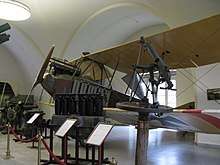Albatros B.I
The Albatros B.I, (post-war company designation L.1) was a German military reconnaissance aircraft designed in 1913 and which saw service during World War I.[1]
| B.I | |
|---|---|
| Paper model of an Albatros B.I(Ph) | |
| Role | Reconnaissance aircraft |
| Manufacturer | Albatros Flugzeugwerke |
| Primary user | Luftstreitkräfte |
Design and development
The B.I was a two-seat biplane of conventional configuration that seated the observer and the pilot in separate cockpits in tandem. The wings were originally of three-bay design, but were later changed to a two-bay, unstaggered configuration. A floatplane version was developed as the Albatros W.I.
Variants
- B.I
- German production aircraft for the Luftstreitkräfte
- Phönix 20.01
- First prototype for Austrian production.[2]
- Phönix 20.02
- second prototype for Austrian production.
- B.I(Ph) series 21
- Production by Phönix Flugzeug-Werke AG at Vienna for the Austro-Hungarian Imperial and Royal Aviation Troops.
- B.I(Ph) series 24
- Production by Phönix Flugzeug-Werke AG at Vienna for the Austro-Hungarian Imperial and Royal Aviation Troops.
- B.I(Ph) series 25
- Production by Phönix Flugzeug-Werke AG at Vienna, with the KNV (Knoller Verspannung) for the Austro-Hungarian Imperial and Royal Aviation Troops; 48 ordered, reduced to 16 due to delays and persistent problems.
Operational history
The B.Is were withdrawn from front line service in 1915 but some examples served as trainers for the remainder of the war.
Operators
- Austro-Hungarian Imperial and Royal Aviation Troops
- Luftstreitkräfte
- Kaiserliche Marine
- The Polish Air Force operated this type postwar.
- Ottoman Air Force
Survivors

The Phönix 20.01, prototype for Austrian production of the Albatros B.I(Ph), is preserved at the Heeresgeschichtliches Museum in Vienna.
Specifications (B.I)
Data from German aircraft of the First World War[3]
General characteristics
- Crew: 2
- Length: 8.57 m (28 ft 1 in)
- Wingspan: 14.48 m (47 ft 6 in)
- Height: 3.15 m (10 ft 4 in)
- Empty weight: 747 kg (1,647 lb)
- Gross weight: 1,080 kg (2,381 lb)
- Powerplant: 1 × Mercedes D.I 6-cylinder water-cooled in-line piston engine, 75 kW (100 hp)
- Propellers: 2-bladed fixed-pitch wooden propeller
Performance
- Maximum speed: 105 km/h (65 mph, 57 kn)
- Range: 650 km (400 mi, 350 nmi)
- Endurance: ca 4 hours
- Time to altitude: 800 m (2,625 ft) in 10 minutes
See also
Related development Albatros B.II - Albatros B.III - Albatros C.III - Lebed XI - Lebed XII Related lists
References
| Wikimedia Commons has media related to Albatros B.I. |
- Taylor, Michael J. H. (1989). Jane's Encyclopedia of Aviation. London: Studio Editions. p. 51.
- Treadwell, Terry C. (2010). German & Austro-Hungarian aircraft manufacturers 1908–1918. Stroud: Amberley Publishing. pp. 236–244. ISBN 978-1-4456-0102-1.
- Gray, Peter; Owen Thetford (1970). German aircraft of the First World War (2nd ed.). London: Putnam. p. 252. ISBN 0-370-00103-6.